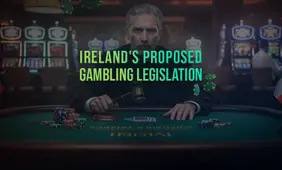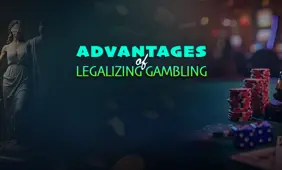A Look at the Top 5 High-Profile Gambling Industry Disputes

One of the largest sectors in the world, with multiple monopolies, there are certainly plenty of players - the gambling industry is not without conflict, especially with so much at stake. Any industry, especially those where large sums of capital are on the line, is inevitably a magnet for trouble, and the gambling industry is no different, especially over the last couple of decades, which has been the subject of significant growth.
There are many reasons why gambling industry conflicts occur, from the poaching of employees from a rival company to the accusation of IP (Intellectual Property) theft, especially at the highest level of the business structure, and this helps to explain one of the reasons why corporate lawyers are in such high demand.

Playtech Sues Caliplay for €122 Million
News has recently emerged that the well-known gambling software provider Playtech is filing charges against Mexican operator Caliplay because of alleged breach of contract to the tune of €122 million; a figure that the heavyweight has reportedly included in its revenue statement for 2023/24.
While Caliplay hasn't yet commented on the matter, Playtech CEO Mor Weizer revealed: "We remain very confident in our ability to execute our strategy and to continue delivering value for our shareholders."
It is understood that the case will go to trial in October this year, and it will be interesting to see how events unfold. However, there are also conflicts against gambling entities from individuals that occur, which often go under the radar, so it got us thinking about the most famous gambling disputes and conflicts that have occurred in the Industry over the last few years and what the outcomes were.
The Case against Borgata and MGM Resorts
In January, US District Court Judge, Madeline Cox Arleo ruled against a plaintiff; a Mr. Sam Antar who filed a lawsuit against the Borgata Casino and parent company MGM Resorts International.
Antar, a self-confessed problem gambler, accused the casino of bombarding him with offers despite reportedly knowing about his alleged addiction. In a statement that outlined her decision, the judge wrote that New Jersey casino law "pervasively regulates the responsibilities of casinos as they relate to compulsive gamblers, but is notably silent on whether casinos or online gambling platforms may induce people who present with compulsive gambling behavior to patronize their businesses."
ESPN, PENN Entertainment vs Major Public Backlash
In August last year, there was somewhat of a conflict with the public when the seemingly true intentions were revealed about major US media company ESPN's $1.5 billion partnershipl with PENN Entertainment.
It quickly became apparent that plans were in place for ESPN to use PENN to create a branded online gambling operator of their own, causing substantial unrest among the public, especially influencers, who cited 'conflict of interest' among other reasons, in an attempt to block the deal.
The intention was for ESPN to take PENN Entertainment's sportsbook, Barstool Sports and rebrand it as their own, using the ESPN name. As such, Tom Jones, a former journalist for a number of local US newspapers turned media columnist, noted concerns regarding the deal, writing about his worry about ESPN: "maintaining journalistic integrity when covering gambling" as well as "being ethical and responsible in dealing with those in the audience who might have gambling problems."
With this going wide on social media, it wasn't long before this piece attracted public comments; one user, Erick Meckle, commented: "Not sure I like a sportsbook being run by an organization with tremendous ability to influence opinions on sports and how they will bet," while another user on X (formerly Twitter) responded: "I cannot wait for this to backfire when Woj or Schefter (two ESPN reporters) give a report on a player that turns out to be inaccurate that adjusts ESPN's betting lines accordingly."
At the time, an ESPN spokesperson revealed to flagship media entity, Forbes: "ESPN is not creating its own sportsbook, and will not be setting odds or directly taking bets," however, it was reported that ESPN was getting $500 million in warrants in order to buy shares in PENN Entertainment.
It was found that ESPN had long been somewhat of a financial hole for owners Disney, following a number of layoffs and this gambling conflict of opinions, via a deal with PENN would, it was thought, help to prevent such actions in the future, following the creation of a new source of potential income.
Hedge Funds Accuse William Hill in Caesars Takeover
During the much-publicised Caesars takeover of William Hill, it was found that there were quite a number of parties caught in the crosshairs. As such, in the aftermath, two hedge funds alleged that the board of William Hill had failed to disclose information regarding the bookmaker's acquisition by Caesars, as they put backing behind shareholders to get a second vote about the deal.
The names in question, GWM Asset Management and HBK Capital Management wrote to the bookmaker's board at the time, prior to a court hearing regarding the approval of the deal. The main conflict in this gaming industry case was that there had not been enough information disclosed to shareholders in order for them to green-light the deal.
GWM was quick to reveal its intentions, in a letter, to challenge the deal and said that "potentially material" information was missing that would give Caesars the ability to end its understanding with William Hill in the US, if another party attempted to acquire the bookmaker.
The hedge fund also stated that if shareholders knew this information, they might have voted differently. Furthermore, it stopped the go-ahead of a potential auction of the company, which could have resulted in a higher price. Sources close to the matter were quick to comment.
The board should have disclosed that Caesars only has the ability to throw anyone into the blacklist once every six months. It can't necessarily block everyone — which is what their original statement suggested.
bwin Gets Hit with Lawsuit by Ice Hockey Star
In 2016, bwin owner GVC Holdings (now Entain) was hit with a possible class action lawsuit in Canada following a dispute with a former business partner. It was revealed that ex-ice hockey player, turned sports entrepreneur Doug Honneger had allegedly entered into a joint venture partnership deal, whereby the Canadian would run the Sportingbet brand in the country.
However, Honneger claimed that GVC reneged on the deal and ultimately launched legal action for claims in the neighborhood of multimillions of dollars in compensation for the work that he did for them between 2014 and 2015, though GVC argued that there was no such agreement in place.
As such, this argument led to Canadian law firm, Findlay McCarthay, specialists in class action lawsuits, to begin work on a case representing thousands of Canadian Sportingbet customers. Its argument was that if, as GVC claimed, a deal did not exist, then it was in serious breach of its gambling license, in addition to Canadian customer protection laws, that gave Honneger (as a supposed licensed business partner) illegal (as it would be classed in these circumstances) access to confidential customer information.
Furthermore, Findlay McCarthy also prepared the argument that if what GVC argued was true and no such relationship existed, then the gambling giant would be in contravention of its Malta Gaming Authority license that allowed customers in Canada to gamble and every bet that the company accepted would be deemed as unlawful.
The firm is considering a class action seeking reimbursement on behalf of betters of all bets placed by Canadian residents through the site of www.sportingbet.com or any affiliated sites
GVC Holdings followed these events with the following statement: "GVC has maintained throughout this process that these allegations are spurious and unfounded. GVC has no doubt in its ability to defend itself if it chooses to pursue them."
Lack of archival information regarding the resolution of this gambling industry conflict suggests that the lawsuit was settled and the records were sealed.

Will Conflicts Increase as the Industry Grows?
With the gambling industry as a whole becoming one of the fastest growing in the world, and the fact that new markets are continuing to pass legislation for this, it has and, inevitably will lead to the emergence of more companies.
As a result, this means a bigger 'turf war' to capitalize on as many potential customers as possible, which could invariably trigger problems. Also, the likely introduction of new technology may certainly cause rifts regarding intellectual property and contract validation, with a whole myriad of possible new legislation having to be applied.
For the biggest companies, it is always a risk for them to be involved in anything that could cause their reputation to be questioned, especially if they are publicly owned and, as a result, cause their share price to take a nose dive due to the negative press. They can ill-afford to be involved in such conflicts, while smaller companies simply do not have the resources to sustain these. However, as we have seen over the years, in an industry such as this, anything is possible, and it isn't necessarily the 'innocent' party that comes out.





Review this Blog
Leave a Comment
User Comments
comments for A Look at the Top 5 High-Profile Gambling Industry Disputes